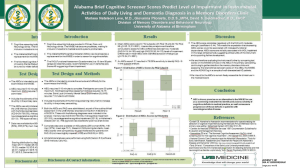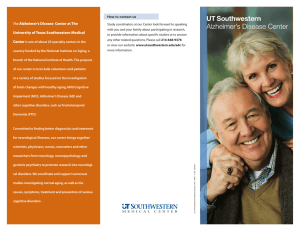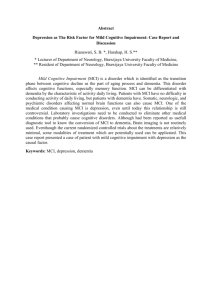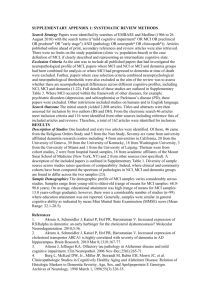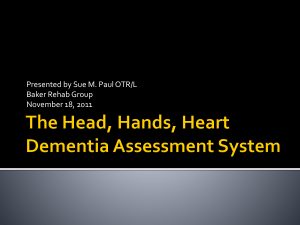Press release - November 5th, 2011.
advertisement
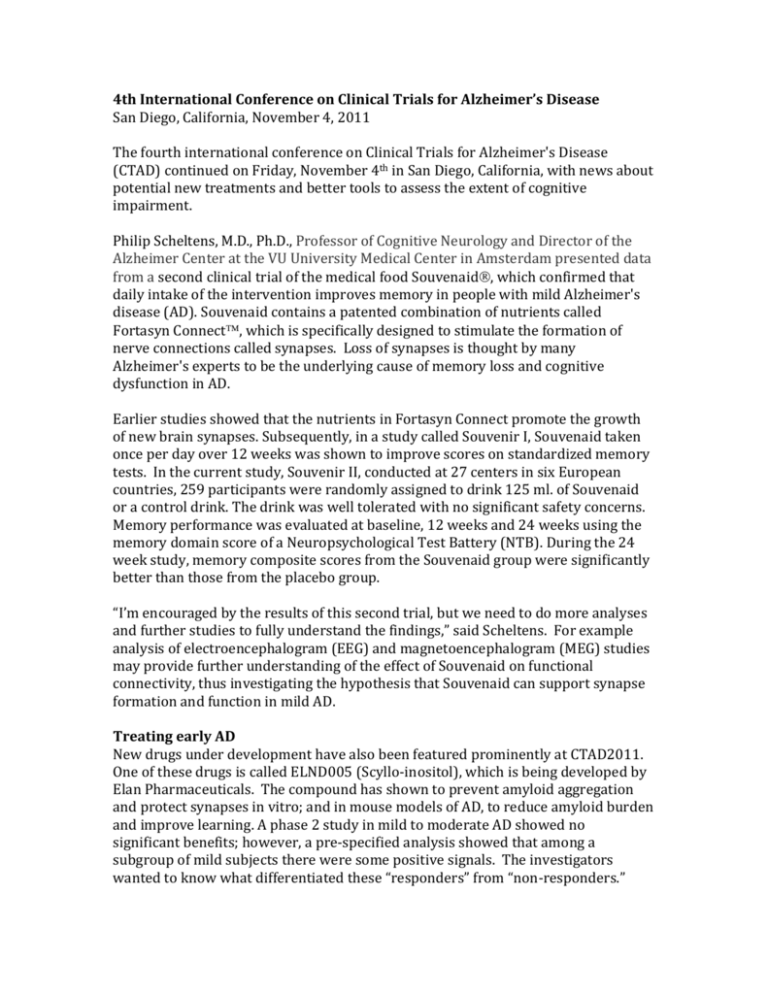
4th International Conference on Clinical Trials for Alzheimer’s Disease San Diego, California, November 4, 2011 The fourth international conference on Clinical Trials for Alzheimer's Disease (CTAD) continued on Friday, November 4th in San Diego, California, with news about potential new treatments and better tools to assess the extent of cognitive impairment. Philip Scheltens, M.D., Ph.D., Professor of Cognitive Neurology and Director of the Alzheimer Center at the VU University Medical Center in Amsterdam presented data from a second clinical trial of the medical food Souvenaid, which confirmed that daily intake of the intervention improves memory in people with mild Alzheimer's disease (AD). Souvenaid contains a patented combination of nutrients called Fortasyn Connect, which is specifically designed to stimulate the formation of nerve connections called synapses. Loss of synapses is thought by many Alzheimer's experts to be the underlying cause of memory loss and cognitive dysfunction in AD. Earlier studies showed that the nutrients in Fortasyn Connect promote the growth of new brain synapses. Subsequently, in a study called Souvenir I, Souvenaid taken once per day over 12 weeks was shown to improve scores on standardized memory tests. In the current study, Souvenir II, conducted at 27 centers in six European countries, 259 participants were randomly assigned to drink 125 ml. of Souvenaid or a control drink. The drink was well tolerated with no significant safety concerns. Memory performance was evaluated at baseline, 12 weeks and 24 weeks using the memory domain score of a Neuropsychological Test Battery (NTB). During the 24 week study, memory composite scores from the Souvenaid group were significantly better than those from the placebo group. “I’m encouraged by the results of this second trial, but we need to do more analyses and further studies to fully understand the findings,” said Scheltens. For example analysis of electroencephalogram (EEG) and magnetoencephalogram (MEG) studies may provide further understanding of the effect of Souvenaid on functional connectivity, thus investigating the hypothesis that Souvenaid can support synapse formation and function in mild AD. Treating early AD New drugs under development have also been featured prominently at CTAD2011. One of these drugs is called ELND005 (Scyllo-inositol), which is being developed by Elan Pharmaceuticals. The compound has shown to prevent amyloid aggregation and protect synapses in vitro; and in mouse models of AD, to reduce amyloid burden and improve learning. A phase 2 study in mild to moderate AD showed no significant benefits; however, a pre-specified analysis showed that among a subgroup of mild subjects there were some positive signals. The investigators wanted to know what differentiated these “responders” from “non-responders.” Anton Porsteinsson, M.D., from the University of Rochester Medical Center and Stephen Salloway, M.D., from Butler Hospital and Brown University both presented data from this post-hoc analysis. Porsteinsson showed that, at baseline (before starting the drug), responders score higher on cognitive measures and performed better in functional assessments. They also had biomarker profiles that suggested lower levels of neurodegeneration. Salloway presented data showing that subjects with better cognition at baseline, based on higher mini-mental state exam (MMSE) scores, also showed more improvement in cognitive measures at the end of the study compared to those with lower MMSE scores at baseline. In other words, those subjects with milder levels of dementia appeared to respond better to the drug. “As we look towards moving this compound into further testing, these findings suggest that focusing on mild AD is appropriate, and where the medication is most likely to have an impact,” said Porsteinsson. Salloway emphasized that they are not using these data to make claims about the drug’s efficacy. Rather they are using this post hoc analysis to determine whether it makes sense to continue developing the drug as a treatment for mild AD. Optimizing tools for assessing cognitive impairment Test accuracy is critical for diagnosis, assessing risk, and assessing response to therapy. In dementia, as in other conditions such as stroke, functional tests are particularly important; yet there is no consensus on which functional measures are best able to capture treatment effects. Moreover, methodological shortcomings can overestimate or underestimate the accuracy of a medical test. At a symposium organized by the Cochrane Dementia and Cognitive Improvement Group in the United Kingdom, Anna Noel-Storr, M.D., discussed how the accuracy and reliability of these measures can be improved is by systematically reporting on their diagnostic accuracy. STARD, or Standards for Reporting Diagnostic Accuracy, is a set of reporting guidelines developed to independently assess the potential for bias and evaluate the validity of various measures. Now, STARD has been tailored to assess diagnostic accuracy of dementia assessments, through an effort called STARDdem. “We want to modify STARD guidelines for dementia to drive better methodology in studies of diagnostic accuracy for dementia,” said Noel-Storr. Another symposium discussed novel instruments for assessing the earliest symptoms of MCI. Although many clinical trials have been designed to evaluate treatments for MCI, none have been successful. Rachelle Doody, M.D., Ph.D., Director of the Alzheimer’s Disease and Memory Disorders Center at the Baylor College of Medicine suggested several possible reasons for these failures. “Maybe the effects of these drugs are temporary and we didn’t measure them at the right time. Maybe the effects are too small. Or maybe the effects were not captured by current outcome measures.” Doody suggested that subjective measures that capture patient perceptions may be more sensitive that objective measures in determining subtle cognitive change in MCI. These measures include the perceived deficits questionnaire (PDQ) and the patient global assessment (PGA). Patient Report Outcomes (PRO) have also been a central focus of the Cognition Working Group of the Critical Path Initiative (C-Path), an industry-sponsored intiative to work collaboratively towards the common goal of achieving better outcomes in clinical trials. “The patient’s voice matters because people want clinical relevance,” said Christopher Leibman, PharmD, of Janssen Alzheimer Immunotherapy. “As we continue to advance, we’ll still need to bring along what is most important to the patients.” Moreover, he said, patients may be the most accurate reporters of that information.
